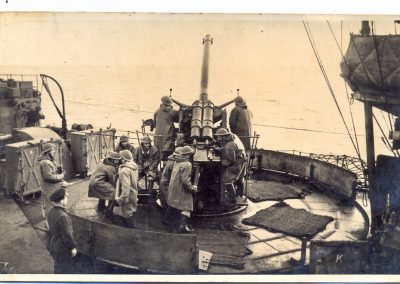Antoni Zielonka‘s military records state that he was born on 12 June 1918 in Sniatycze, a village in south-eastern Poland in the Lublin district close to the Ukrainian border. He was actually born in Moscow but his family moved to Sniatycze soon after his birth. His father was Polish and his mother possibly of Ukrainian ancestry. He worked on his father’s farm as soon as he left school aged fifteen.
The commencement of the Second World War on 1 September 1942 was to profoundly change the course of his life. He escaped the advancing Germans and travelled east into Western Ukraine, which was still at that stage part of the 2nd Polish Republic. Having found work in railway construction, he was arrested and imprisoned by the Soviet police (NKVD) in June 1940 for the trumped-up charge of “illegally trespassing the state border”. From July 1941, he was transferred to the hard labour camps at Kotlas and Vorkuta in Northern Russia, both situated near or above the Arctic circle and reputed to be two of the harshest gulags under the Stalinist regime.
After fifteen months in captivity, he was released in September 1941. He then probably worked in a kolkhoz (collective farm) in Central Asia to recuperate prior to enlisting in the Polish Army being formed on Soviet territory. In February 1941, he enlisted in the 23rd Regiment, 7th Division under General Wladyslaw Anders in Kermine, Uzbekistan. At this juncture, he volunteered to join the Polish forces in Great Britain. Following evacuation across the Caspian Sea, he travelled overland via Iran, Iraq, Palestine and Egypt. Sailing around most of the African continent, he arrived at Greenock, Scotland in late August 1942. He opted to join the Polish Navy at Auchtertool, Scotland.
He served in the Polish navy from September 1942 to August 1946. Having received training as a Specialist Mechanical (Machine) Engineer, he was promoted to the rank of Able Seaman in 1944. Antoni served on four ships – ORP Orkan, a destroyer from 1942 to1943, ORP Dragon, a cruiser, in 1944, ORP Conrad, another cruiser, from 1944 to 1945 and finally the destroyer, ORP Piorun, in 1946.
Antoni saw action in a number of key Second World War campaigns and battles including Arctic convoys in 1943, Atlantic Convoys from 1943 to 1945 and the Allied D-day landings at Normandy in 1944. He was decorated with a number of British medals including the 1939-1945 Star, the Atlantic Star, the Arctic Star, the France & Germany clasp and the War medal. He also received the Polish Sea medal (Morski) and bar.
Due to illness, Antoni was land-based when his first ship, ORP Orkan, was torpedoed and sunk in October 1943 with only 44 men of the crew of 223 surviving. He was less fortunate when his next ship, ORP Dragon, was also torpedoed off of Normandy in July 1942. Thirty-eight of his colleagues lost their lives.
Antoni spent time at the Polish Naval Training and Reserve Camp at Okehampton in October 1945, August 1946 and December 1946 to January 1947. Having decided to remain in Great Britain, he enlisted in the Polish Resettlement Corps in February 1947 which was designed to facilitate a smooth transition to British civilian life via vocational training, English lessons and work experience. He attended the Okehampton Camp in its new function as a Resettlement Centre briefly on two occasions in August and December 1947.
Antoni permanently moved to the West Midlands in 1948 and worked as an engineer in Wednesbury near Wolverhampton. He married an English lady in 1950, had two daughters and died in 2014.


